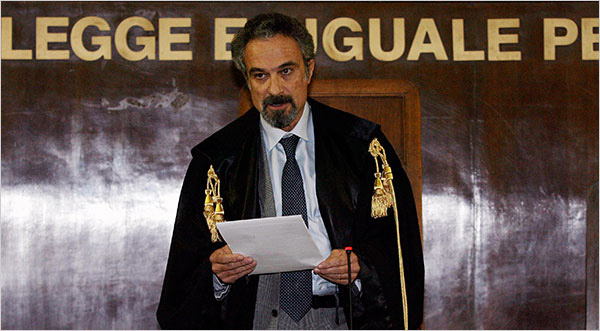
|  |  |  Americas & Beyond | November 2009 Americas & Beyond | November 2009  
Italy Convicts 23 Americans for CIA Renditions
 Rachel Donadio - New York Times Rachel Donadio - New York Times
go to original
November 04, 2009


| | Judge Oscar Magi convicted 23 Americans of kidnapping in the 2003 abduction of a Muslim cleric on Wednesday in Milan. (Alessandro Garofalo/Reuters) |  |
Milan — In a landmark ruling on Wednesday, an Italian judge convicted a C.I.A. station chief and 22 other Americans accused of being C.I.A. agents of kidnapping in the 2003 abduction of a Muslim cleric from the streets of Milan.

An enormous symbolic victory for Italian prosecutors, the case was the first ever to contest the United States practice of rendition, in which terrorism suspects are captured in one country and taken for questioning in another, presumably one more open to coercive interrogation techniques. The case was widely seen as an implicit indictment of the measures the Bush administration relied on to fight terrorism.

Judge Oscar Magi handed an eight-year sentence to Robert Seldon Lady, a former C.I.A. station chief in Milan, and five-year sentences to 22 other Americans. Three of the other high-ranking Americans were given diplomatic immunity, including Jeffrey Castelli, a former C.I.A. station chief in Rome.

The judge did not convict three high-ranking Italians charged in the abduction, citing state secrecy, and a former head of Italian military intelligence, Nicolò Pollari, also received diplomatic immunity. All the Americans were tried in absentia and are considered fugitives.

Through their court-appointed lawyers, they pleade not guilty.

Italian prosecutors had charged the Americans and seven members of the Italian military intelligence agency in the abduction of Osama Moustafa Hassan Nasr, known as Abu Omar, on Feb. 17, 2003. Prosecutors said he was snatched in broad daylight, flown from an American air base in Italy to a base in Germany and then on to Egypt, where he claims he was tortured.

That Italy would convict intelligence agents of an allied country was seen as a bold move that could set a precedent in other cases.

But the convictions may have little practical effect. They do not seem to change the close relations between the United States and Italy. Nothing new was learned about whether the government of Prime Minister Silvio Berlusconi had approved the kidnapping. It seemed highly unlikely that anyone, Italian or American, would spend any time in jail.

Armando Spataro, the counter-terrorism prosecutor who brought the case, said he was considering asking the Italian government for an international arrest warrant for the fugitive Americans.

Mr. Spataro said he was pleased with what he called a “very courageous” verdict. He said it was a victory that “we brought the trial to an end, and the facts were shown to be what they were.” In his closing remarks on Wednesday, Mr. Spataro denounced torture and said that the abduction undermined the work of Italian counterterrorism investigators. He also criticized American authorities for not cooperating with the Italian justice system.

Since it began in 2007, the trial has faced many complex legal hurdles. That it has reached this late stage is a testament to the persistence of Mr. Spataro, a veteran of counterterrorism and Mafia investigations, and the earlier rulings of Judge Oscar Magi.

In May, Mr. Magi ruled that there was enough evidence to proceed with the case even after Italy’s Constitutional Court ruled in March that all evidence of coordination between the Italian secret services and the C.I.A. violated state secrecy rules and was therefore inadmissible in the trial.

Judge Magi also asked for $1.45 million in damages for Mr. Nasr and $750,000 for his wife, Ghali Nabila. In separate lawsuits, Mr. Nasr, who is now living in Alexandria, Egypt, is seeking $14 million in damages from the defendants, and h is wife is seeking $7.4 million against the Italian authorities “for their refusal to cooperate” with justice. In August the couple also filed a suit with the European Court of Human Rights.

At the time of his abduction, Mr. Nasr was under surveillance by the Italian authorities, who suspected him of delivering sermons preaching violence from his Milan mosque and recruiting militants to send to Iraq in anticipation of the American invasion. He disappeared for a year after his abduction, finally resurfacing in Egypt, where he called his wife in Italy to say he had been tortured.

The phone call was enough to activate Italian prosecutors, who are required to investigate if there is the possibility a of a crime.

Prosecutors were able to reconstruct his disappearance using cellphone records traced to the American agents. The operatives used false names but left a significant paper trail of unencrypted cellphone records and credit card bills at luxury hotels in Milan, suggesting they believed they were operating with latitude.

Court-appointed lawyers for several of the American defendants claim that prosecutors never adequately established their clients’ identities.

“The CIA has not commented on any of the allegations surrounding Abu Omar,” said Paul Gimigliano, a C.I.A spokesman.

Italian government has denied involvement.

In June, Il Giornale, a newspaper owned by a brother of Prime Minister Silvio Berlusconi and widely seen as close to the Italian government, published an interview that it said it had conducted via Skype with Mr. Lady, who has since retired and whose whereabouts are unknown. In the interview, he said of Abu Omar’s abduction, “Of course it was an illegal operation. But that’s our job. We’re at war against terrorism.”

Among the 22 Americans convicted was Sabrina De Sousa, who worked in the United States Embassy in Rome and was accused of having worked closely with Mr. Lady Ms. De Sousa, who denied the prosecutors’ assertion that she was a C.I.A. operative, sued the State Department for diplomatic immunity.

Mark Mazzetti contributed reporting from Washington.
|

 |
|  |



